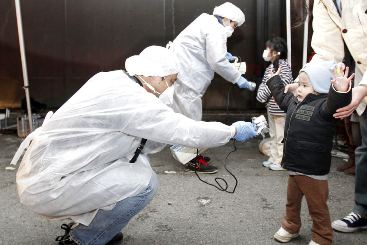 Authorities in Japan are scanning thousands of people for radiation exposure after an explosion at a nuclear power plant forced mass evacuations from surrounding areas.
Authorities in Japan are scanning thousands of people for radiation exposure after an explosion at a nuclear power plant forced mass evacuations from surrounding areas.
Operators of the Fukushima nuclear reactor are downplaying its threat to public safety, but there are reports that three people have been injured by radiation exposure.
The explosion sent plumes of smoke spewing from the ageing plant in the country’s north, raising fears of a possible meltdown, but prime minister Naoto Kan has called for calm.
The government declared an atomic emergency and evacuated about 140,000 people living within 20 kilometres of the facility.
Television images have shown the walls and roof of the reactor building being blown apart by the explosion and authorities are preparing to distribute iodine to people living near the reactors to protect them against radiation exposure.
The plant has leaked radiation, but the company that runs it, Tokyo Electric Power (Tepco), says the structure encasing the reactor had collapsed at the time of the aftershock but the steel reactor inside it was not ruptured.
At evacuation centres, workers wearing white masks and protective clothing have used handheld scanners to check everyone arriving for radiation exposure.
“There is radiation leaking out, and since the possibility (of exposure) is high, it’s quite scary,” said 17-year-old Masanori Ono, queuing at a centre in Koriyama city.
People who live within the evacuation zone or show signs of radiation exposure have been separated from others seeking shelter.
The World Health Organisation says the public health risk appears to be “quite low”, but residents who have been evacuated to shelters say they are still worried about the threat.
“Officials said 10 kilometres or 20 kilometres away is safe,” one resident said.
“But the radiation may change and go out wider. It’s very disturbing. There is no way to get out of here.”
‘Complete disaster’
A US nuclear expert has called the nuclear accident one of the three worst in history and warns it could become a “complete disaster” if it goes to a full meltdown.
“This is going to go down in history as one of the three greatest nuclear incidents if it stops now,” Joseph Cirincione, the head of the Ploughsares Fund, told CNN.
“If it continues, if they don’t get control of this and … we go from a partial meltdown of the core to a full meltdown, this will be a complete disaster,” he said.
But Japan’s nuclear safety agency has rated the accident at 4 on the international scale from 0 to 7, an official says.
On the International Nuclear Event Scale, a level 4 incident means a nuclear reactor accident “with local consequences”.
It is on the same level as the worst nuclear incident Japan has experienced, matching the 1999 accident in which a critical nuclear reaction hit an uranium processing plant in Tokaimura, resulting in a radiation leak.
“Right now we are considering the accident should be rated four,” said a Nuclear and Industrial Safety Agency official.
“The rating may be changed in accordance with the development of the condition.”
Meanwhile, favourable winds will likely blow possible radioactive pollution out over the Pacific Ocean, the French Nuclear Safety Authority says.


